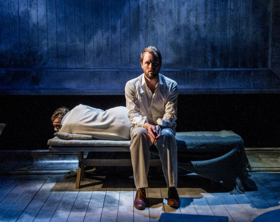Review: National Theatre of Norway's PRIVATE CONFESSIONS a Searing, Unforgettable Celebration of Ingmar Bergman's Genius

For serious filmgoers, an evening spent with Ingmar Bergman's classics - from The Seventh Seal to Wild Strawberries, to Persona and beyond - is as essential as air. But it comes at a price, because Bergman clearly had demons to exorcise, not all of them immediately visible to the naked eye. Even to Bergman himself.
With this intensely personal work, Private Confessions, Bergman forced himself to return to one of the most traumatic experiences any child can ever experience; the revelation of his mother's infidelity, and the resulting breakdown of his father. He also had to make sense of a childhood confrontation, the reasons for which he could not understand until later in life; the words with which he cursed his father, after his confinement in a mental institution obviously remained vivid in his memory. And only now did Bergman realize the harm he had done, through his ignorance of his father's suffering.
Bergman's protégé Liv Ullmann directed the film version of Private Confessions in 1996, and now with the arrival of the centennial of Bergman's birth, Ullmann has returned to the scene of Bergman's heartbreak, with added depth and humanity. Milja Salovaara's sparely-furnished set is, explicitly, a set which the actors, and the narrator (Kari Simonsen) move into and out of. The upstage wall is a wash of colors that, depending on the refraction of Martin Myrvold's delicate lighting, look like tufts of clouds, the backdrop at a portrait photographer's studio or a soiled, decrepit alley.
Marte Engebrigsten is utterly unforgettable as the mother, Anna, who in her restlessness and self-absorption has seduced one of her minister-husband's own theology students. Her lover, Tomas, played by Morten Svartveit with affecting naiveté, is clearly concerned about the consequences of what Anna is asking for, and their coupling (there is brief nudity here) is so fraught with conscience that there is little joy to be seen.
The play opens with Anna confessing her affair to her uncle Jacob-who, like her husband Henrik, is an elite Lutheran minister. Jacob advises that she be totally honest with Henrik, on the assumption that living a lie is more dangerous to Anna's soul than living in truth. But Anna suspects, and the audience soon sees, that Henrik will be unable to bear the burden of her truth. In an echo of Henrik Ibsen's tragedy of truth-telling, Wild Duck, we see Anna's husband Henrik transformed from a gentle, trusting soul to a man consumed by demons of doubt and regret.
Bjørn Skagestad offers a ray of light as uncle Jacob, a deeply religious man whose expression of faith reveals a sophistication not usually found in stage-clergy. His gentle demeanor reminds us that life isn't all doom and gloom, but that good folk are often powerless to set things right when a troubled soul like Anna is determined to make a mess of things.
As her husband Henrik, Mattis Herman Nyquist gives a stunning performance; at first he seems comical, almost deer-in-headlights, when Anna first confesses her affair. It is only later, when Henrik internalizes Anna's truth, that we see his descent into madness, and it is truly terrifying and pitiful to watch. Later, after his release from the asylum, Henrik recalls his son's denunciation-Bergman remembering, through his father's own words, the pain caused by a child's rebuke.
The closest thing to a conscience Anna has lives in the form of her mother Karin, played here with stern majesty by Liv Bernhoft Osa. Karin's confrontation with her daughter, and the daughter's refusal to acknowledge her responsibility for her husband's fragile state, creates some of the most indelible images here; Anna's reluctance to tell her own mother the truth, and the reluctance with which Karin offers Anna her hand to hold as she leaves, speak volumes. Karin had raised Anna to be independent, but is horrified to find that Anna has chosen to think only for herself.
Because Private Confessions is framed as a story about a story, there is little need for chronological sequencing; Act 2, therefore, creates earlier scenes, one from an important chapter in Anna's affair facilitated by her friend Märta, (the charming Anneke von der Lippe); it is only toward the end that we see the younger Anna, plagued by doubts on the eve of her first Communion, speaking openly with a much younger uncle Jacob. The effect is all the more poignant, in that we know what is to come.
With access to a wide range of materials - his mother's diary, his father's letters, and Bergman's own diary from the original film production-we are able to examine a human tragedy of epic proportions, with the analytical distance that enables us to appreciate its depth. Private Confessions is a heart-breaking story, and one that demands our attention and compassion for its victims all around.
I say tragedy, because Private Confessions scales the heights of human passion to rival Aeschylus or Sophocles. With a difference: in the tragic cycle Oresteia, Clytemnestra hid her infidelity from Agamemnon and killed him in his bath; Bergman's mother murdered his father's spirit by telling him the whole truth, and watching him agonize over it for years-a murder that worked its slow and inexorable path through his soul and everyone else's.
Audience Advisory: Private Confessions features explicit sexual language and brief nudity.
Photo: Marte Engebrigsten as Anna (lying down) and Mattis Herman Nyquist as Henrik. Photo by Erik Berg.
Performance Time: 2 hours 40 minutes with one intermission.
Private Confessions runs through December 9 at the Kennedy Center in Washington, D.C. For more information about events there visit: http://www.kennedy-center.org/
Reader Reviews
Videos

